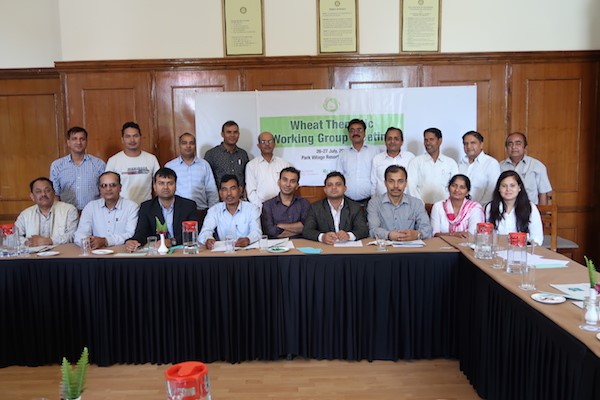KATHMANDU, Nepal (CIMMYT) — The Government of Nepal recently endorsed a new twenty-year agriculture development strategy that charts a progressive course of action to revitalize agriculture as an engine for economic growth and domestic food security.
At the center of this strategy is the recently launched the Prime Minister Agriculture Modernization Project (PMAMP). The project will be implemented over the next decade and has research and development mandates for productivity enhancement and commercialization of major cereals, fisheries, fruits and vegetables.
PMAMP emphasizes wheat production as a priority, especially in the Terai – a very productive agricultural area – in order to achieve national self-sufficiency in wheat production within the next three years. Meeting this extremely ambitious goal will require an unprecedented increase in average yields of 10 percent per year, and a high level of strategic coordination among organizations contributing to agricultural development in Nepal.
The PMAMP leadership has requested that the International Maize and Wheat Improvement Center (CIMMYT) through its Cereal Systems Initiative for South Asia (CSISA) act as a technical advisor and strategic partner to design and implement programs for staple crop production, including mechanization and seed systems.
On July 26-27 in Kathmandu, PMAMP and CSISA organized the first working group forum for wheat to begin to unite and coordinate efforts of 21 core public and private stakeholders working on extension, research and sector development.
Discussion at the forum emphasized the identification of proven best practices for sustainable intensification, consideration of scaling pathways for knowledge and technological innovations, knowledge gaps and areas for future research and joint work plan development for the 2017-2018 wheat season.
A four-member committee representing PMAMP, the Nepal Agricultural Research Council (NARC), CSISA and the private sector has been created to guide implementation of the collaborative work plan for wheat intensification across Nepal.
Rajan Dhakal, senior agriculture officer at PMAMP, remarked that the forum was instrumental in identifying technical priorities and clarifying how the efforts of diverse partners can contribute to the food security goals of the Government of Nepal.
Y.P. Giri, chair and director of crops and horticulture at NARC, said he appreciated CSISA’s efforts to facilitate discussion and coordination across a diverse set of stakeholders through a common and action-oriented platform.
Drawing on the success of the wheat forum, PMAMP will convene meetings for maize and rice with support from NARC, CSISA and private sector partners this fall.
CIMMYT launched the Cereal Systems Initiative for South Asia (CSISA) in 2009 to promote durable change at scale in South Asia’s cereal-based cropping systems. CIMMYT operates rural “innovation hubs” in Bangladesh, India and Nepal to increase the adoption of various resource-conserving and climate-resilient technologies, and to improve farmer access to market information and enterprise development. Learn more about CSISA’s impact here.

 Capacity development
Capacity development